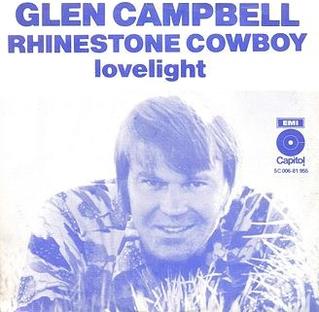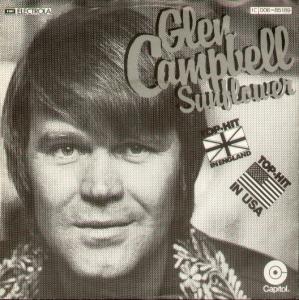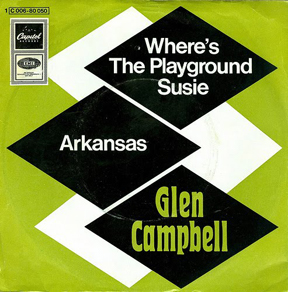
"Rhinestone Cowboy" is a song written by Larry Weiss and recorded by American country music singer Glen Campbell. When released on May 26, 1975, as the lead single and title track from his album Rhinestone Cowboy, it enjoyed huge popularity with a both country and pop audiences.

"Let It Be Me" is a popular song originally published in French in 1955 as "Je t'appartiens" interpreted by Gilbert Bécaud. It became popular worldwide with an English version by the Everly Brothers and later with the duet by Betty Everett and Jerry Butler.
"I Remember You" is a popular song, published in 1941. The music was written by Victor Schertzinger, with lyrics by Johnny Mercer. The song was originally recorded by Jimmy Dorsey in 1941. It has since been covered most notably by Frank Ifield, Glen Campbell and Bjork.
"Together Again" is a 1964 song by United States country singer and guitarist Buck Owens.

"Don't Pull Your Love" is a song written by Brian Potter and Dennis Lambert which became a top ten hit single in 1971 for Hamilton, Joe Frank & Reynolds.

"Southern Nights" is a song written and recorded by Allen Toussaint, from his 1975 album, Southern Nights, and later recorded by American country music singer Glen Campbell. It was the first single released from Campbell's 1977 album, Southern Nights, and reached No. 1 on three separate US charts. It was covered by the Chicago band Whitney in 2015.

"Galveston" is a song written by Jimmy Webb and popularized by American country music singer Glen Campbell who recorded it with the instrumental backing of members of The Wrecking Crew. In 2003, this song ranked number 8 in CMT's 100 Greatest Songs in Country Music. Campbell's version of the song also went to number 1 on the country music charts. On other charts, "Galveston" went to number 4 on the Billboard Hot 100 and number one on the "Easy Listening" charts. It was certified gold by the RIAA in October 1969.

Steve Wariner is an American country music singer, songwriter and guitarist. His discography comprises nineteen studio albums, six compilation albums, and fifty-five singles. Of his studio albums, three are certified gold by the Recording Industry Association of America (RIAA) for shipments of 500,000 copies each: 1991's I Am Ready, and Burnin' the Roadhouse Down and Two Teardrops from 1998 and 1999 respectively. I Am Ready was Wariner's first release for Arista Nashville following tenures on RCA and MCA Nashville, and Burnin' the Roadhouse Down his first for Capitol Records.

"Only Love Can Break a Heart" is a popular song from 1962, performed by the American singer-songwriter Gene Pitney. The song was written by Hal David (words) and Burt Bacharach (music) and appears on Pitney's second album Only Love Can Break a Heart.

"My Boy" is a popular song from the early 1970s. The music was composed by Jean-Pierre Bourtayre and Claude François, and the lyrics were translated from the original version "Parce que je t'aime, mon enfant" into English by Phil Coulter and Bill Martin.

"Then You Can Tell Me Goodbye" is a song written by John D. Loudermilk. It was first released in 1962 by Don Cherry, as a country song and again as a doo-wop in 1967 by the group The Casinos on its album of the same name, and was a number 6 pop hit that year. The song has since been covered by Eddy Arnold, whose version was a number 1 country hit in 1968, and by Neal McCoy, whose version became a Top 5 country hit in 1996.
"Funny How Time Slips Away" is a song written by Willie Nelson and first recorded by country singer Billy Walker. Walker's version was issued as single by Columbia Records in June 1961 and peaked at number 23 on the Hot C&W Sides chart.
"I Wanna Live" is a song written by John D. Loudermilk and recorded by American country music singer Glen Campbell. It was released in March 1968 as the lead single from the album, Hey Little One. The song was Campbell's sixth release on the country charts and his first of five number ones on the country chart. The song spent three non-consecutive weeks at number one and a total of fifteen weeks on the country charts. The song was also Glen Campbell's third Top 40 release peaking at number thirty-six.
"I Love You Because" is a song written and recorded by country music singer and songwriter Leon Payne in 1949. The song has been covered by several artists throughout the years, including hit cover versions by Al Martino in 1963 and Jim Reeves in 1964.

Australian-American singer Helen Reddy (1941–2020), often referred to as the "Queen of 70s Pop", recorded 18 studio albums, seven of which have achieved sales of 500,000 units in the US for which they were awarded Gold certification by the Recording Industry Association of America. One of those seven, I Am Woman, eventually went Platinum by reaching sales of one million copies, and her first compilation album, Helen Reddy's Greatest Hits, was awarded Double Platinum status in 1992 for hitting the two million sales mark. The respective US and Canadian album charts in Billboard and RPM magazine each had appearances by 10 of these LPs during the 1970s.
"Try a Little Kindness" is a song written by Curt Sapaugh and Bobby Austin, first recorded by American country music singer Glen Campbell. The song was a hit on three different music charts: it peaked at number two for one week on the country charts. "Try a Little Kindness" went to number one for one week on the Hot Adult Contemporary chart as well as peaking at number 23 on the Billboard Hot 100.

"Sunflower" is a song written by Neil Diamond and recorded by American country music singer Glen Campbell. It was released in June 1977 as the second single from Campbell's 1977 album, Southern Nights. "Sunflower" was the last of eight number ones on the Easy Listening chart for Campbell. The single spent one week at number one and peaked at number 39 on the Billboard Hot 100. "Sunflower" peaked at number four on the US country chart.
"Everything a Man Could Ever Need" is a song written by Mac Davis, and recorded by American country music artist Glen Campbell. It was released in June 1970 as the first single from his album Norwood. The song peaked at number 5 on the Billboard Hot Country Singles chart. It also reached number 1 on the RPM Country Tracks chart in Canada.
"Hey Little One", a song written by Dorsey Burnette and Barry De Vorzon, was initially recorded by Dorsey, released on May 2, 1960 on the Era label as the double A-side "Hey Little One"/"Big Rock Candy Mountain". "Hey Little One" reached number 48 on the Billboard Hot 100 chart. Musicians on the recording include veteran session drummer Earl Palmer.

"Where's the Playground Susie" is a song written by Jimmy Webb and recorded by American country music singer Glen Campbell. It was released in April 1969 as the second single from the album Galveston. The song peaked at number 26 on the Hot 100, number 28 on the U.S. Billboard Hot Country Singles chart, and number 8 on the Canadian RPM Top Singles chart.












